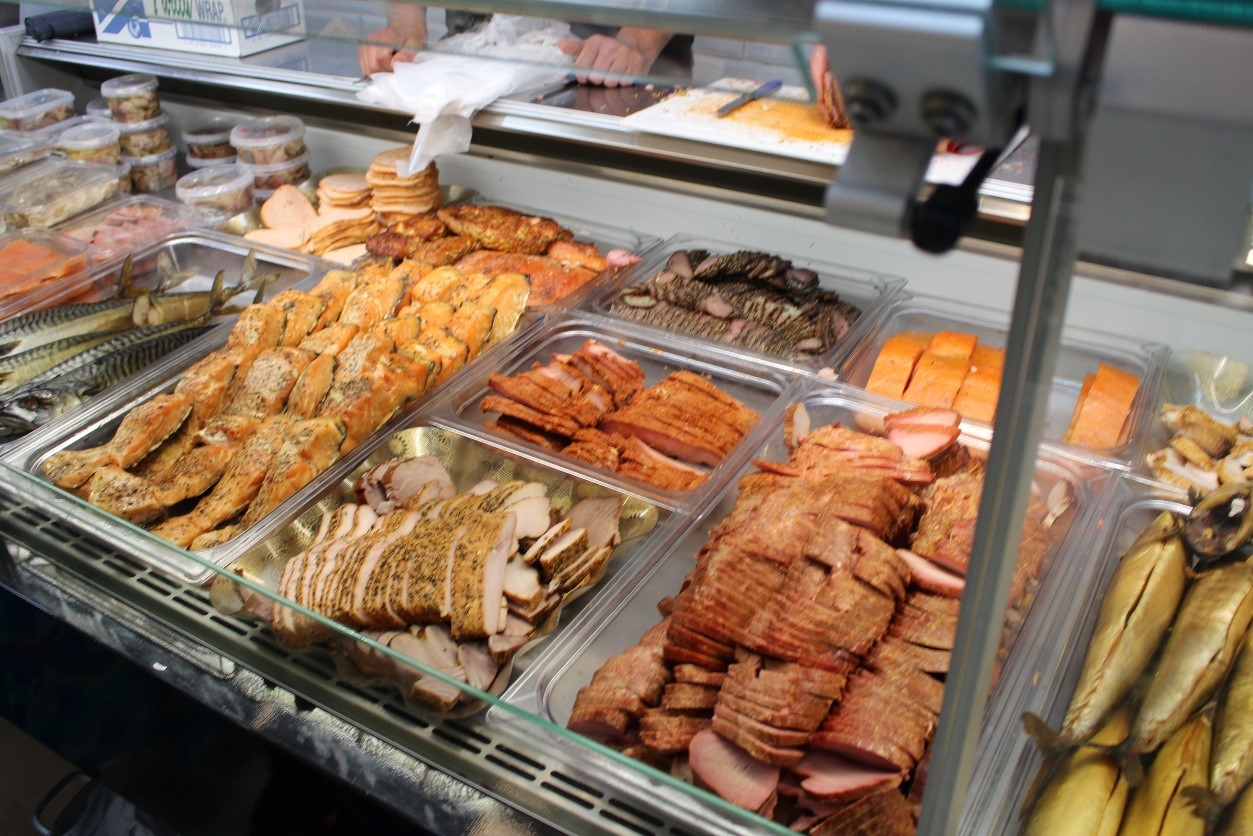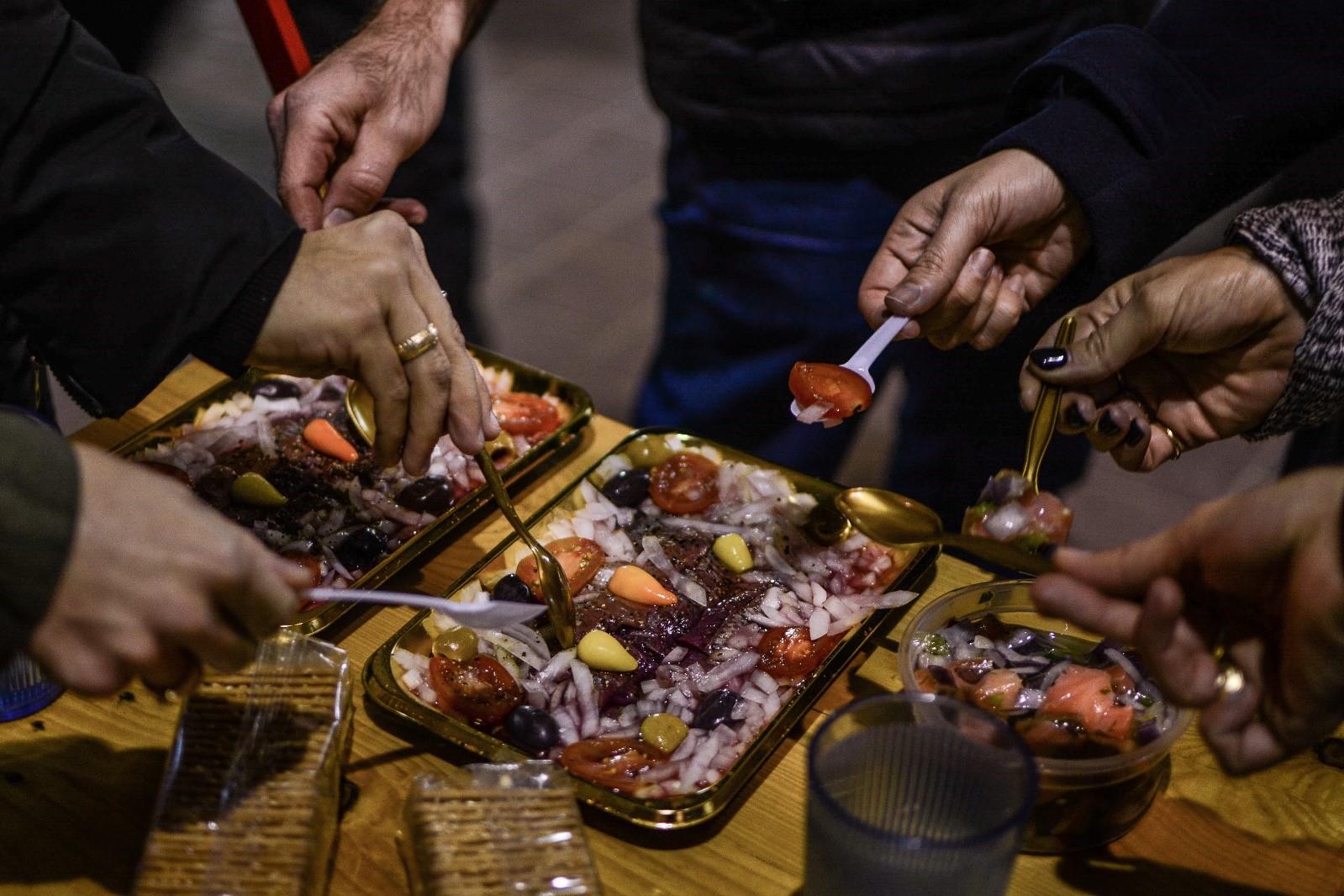Bnei Brak from an Unexpected Angle: A Secular Guide's Unique Encounter
He's not religious nor traditional. 'I'm completely secular,' declares Assaf Salant, a veteran tour guide, to Eric, a local resident. 'It's hard to explain, but people who aren't observant are simply drawn here. It's fascinating for them.' A special journey.
 (Photos: Assaf Salant)
(Photos: Assaf Salant)Walking down the bustling and colorful main street of Bnei Brak, where one usually sees charming children returning from the 'Metmidim', girls pushing strollers loaded from neighborhood sales, young men rushing to the Beit Midrash, hardworking Jews hurrying to catch the 'Daily Page' lesson, and mothers holding their toddlers’ hands tightly to prevent them from leaping into the busy traffic of buses and sometimes even cars, with everything happening in such a beautiful, Jewish atmosphere, suddenly I notice a group of secular men and women strolling peacefully, led by a secular guide trying to explain the mysteries of the sector.
I decided in a split second to approach him. After all, we're all Jews, aren’t we?
Hello, friendly guide, my name is Eric. I'm a local resident. For some reason, you don’t look local to me. Maybe you agree to tell me who you are and what you're doing in our city? Perhaps you want to become religious?
The guide slows down the group a bit and answers me, "Hello Eric, I’m Assaf Salant (33), an average Tel Avivian, a declared secular, and yet I'm here in Bnei Brak, currently guiding the tour you see before you, for secular men and women curious to see Bnei Brak up close."
The Bulletproof Vests and Helmets
If that's why you came, I understand you brought bulletproof vests and helmets
"No bulletproof vests or helmets, nor a weapon escort; we came with a different approach, one that encompasses the opinions of those who seem different from us but ultimately are our brothers." The nice guide is hurrying, so we parted ways and agreed to talk after the tour.
A commitment is a commitment, and I indeed show up at the appointed time.
Hey Assaf, you said your family name is Salant, and you also said you are completely secular. As an ultra-Orthodox, it doesn't quite add up to me because the name Salant automatically takes me to Rabbi Israel Salanter, the founder of the Musar movement. Do you have a family connection?
"You're not mistaken," Assaf replies to me, "Indeed, I'm secular, but I'm proud of my family name because I'm truly a descendant of Rabbi Israel Salanter. I'm not sure if he would be proud of me; you probably think not, but after our entire conversation, you decide whether my great-grandfather would be proud of my actions or not."
Assaf Salant, 33, is partnered with Moni Kahlon, also 33. In the background, Moni studied for a master's in clinical psychology, and Assaf worked for a consulting company. But one morning, they concluded they had had enough and decided they wanted to engage with people, humanity, and also food. Together, they established a business called 'Boka', which deals with guiding food tours across the country.

One of their first tours, perhaps surprisingly, is the tour in Bnei Brak.
It sounds very intriguing to me, I tell Assaf. What exactly brings you, a born and declared secular guy who has the whole world before him - the great Tel Aviv with its multitude of sites, Jaffa, Ramat Gan, Giv'atayim, Petah Tikva, and more - and from all these, you choose to come to Bnei Brak? In the eyes of the average secular person, Bnei Brak is not considered a preferred tourist destination, to say the least.

"I'm going to surprise you," Assaf tells me. "You'll be amazed to hear, the city of Bnei Brak is considered one of the top sites among the variety of tours we offer to the Israeli tourist. There's something in the atmosphere here that electrifies people; they can't believe that everything they've been told for decades is here before them and looks different. People start the tour with one opinion, and as we walk through the narrow streets of Bnei Brak, we discuss everything—politics, history, architectural planning, culture, social processes, music, and everything that makes the other different. We touch on a wide range of topics, and lo and behold, after three hours, you hear real secular people speaking differently about the ultra-Orthodox in general and the Bnei Brakians in particular. It simply changes them. Now tell me, Eric, whether my great-grandfather, Rabbi Israel Salanter, is proud of me or not?"
Of course, he's proud of you. Any act that leads to bringing hearts together is an act Hashem is proud of. It requires special abilities to have this approach; would you agree to reveal the secret?
"First, precisely because of the image many in the secular public have of the ultra-Orthodox sector, at the start of the tour, we invite participants to set aside their prejudices to try arriving open-minded for the experience they will undergo in the coming hours. Later, when the shelf is full, it’s much easier to speak to their hearts and show the true beauty of the residents living here, the modesty, the simplicity, the variety of opinions, the rabbis, the courts, and even the disagreements.
"We prove to people that everything they heard or saw on TV doesn’t always reflect reality. If some fellow threw a plastic bottle in Mea Shearim, it doesn’t mean we’ll end up with eggs on our heads in Bnei Brak. It’s not one battalion or one unit; people live here who love others and also know how to nicely accept the other, essentially us."
But Assaf, my friend, you are also human, and you're influenced by the environment. With hand on heart, tell me about your fears during your first tour in Bnei Brak
"You’re right, Eric, you quickly grasp the matter. Initially, I was quite fearful, but the encounter with the amazing eatery owners and the tolerant Bnei Brak street that welcomes us, quickly reassured me and made me feel very comfortable wandering the city's streets with our groups. A big part of it is our internal feeling, and what happens around us doesn’t always matter. It does happen sometimes that a participant tells me at the beginning of the tour: 'I wandered in Bnei Brak in the past and felt hostility', and I try to suggest another approach - 'Is this feeling truly a result of an objective experience you had here, or is it hostility you're bringing from home? An internal sensation you’re seeking confirmation for?'
"People tend to paint the world black and white, and we offer them the colors in between. We tell them: 'Give it a chance', and if they give it a chance, the results are amazing."
I'm very surprised by your statements, because nowadays, people aren’t really interested in understanding various sectors and opinions. Why do you think this is missing in their lives?
"You are 100% right, which is why our tool at 'Boka' for bringing hearts closer and removing barriers is food. People love food and are curious about it, and we find it a useful and tasty tool for recognizing and understanding other populations."

The Cherry of Bnei Brak
When I look at the group Assaf is leading, I find it's probably true. After they've opened their hearts with various fish salads at Moishi Friedman's and Aryeh from 'Smoked' pampering them royally, it turns out that with the herring oil and a bit of sesame on the crackers, things slide more smoothly into people's hearts.
I'll tell you the truth, food is a lot, but it's definitely not everything. I assume besides food, there are more things in Bnei Brak. Could you reveal some hidden discovery to me?
"It's hard for me to explain it to you, but the entire essence here is a discovery. The warmth, the g'machim, the mutual aid, the humility, and simplicity, but if you insist on something colorful, I think it’s the very picture of a group of secular people sitting on the steps of the Ponevezh Yeshiva, talking about this and that, while charming boys pass by without anyone saying a word or making a fuss. Because yes, despite the old stigmas, we see on the ground that they simply respect us as we are. You would call it 'sanctification of Hashem's name', I call it 'being human', and it's not contradictory."
Well, Assaf, your words are really interesting and moving. Thank you so much for agreeing to talk with me and sharing with our readers the experiences and good deeds you're doing.
But Assaf stops me and doesn’t let me end the interview just like that.
"I haven't told you about the cherry," he almost shouts.
Cherry? Cherries are everywhere; what’s special about the cherries of Bnei Brak?
Assaf seems excited when he wants to tell me about the cherry. "Such a cherry doesn’t exist anywhere in the world," he tells me. "It was the cherry of our tours of all times. In one of our tours, during the previous Sukkot holiday season, I wanted to take my tourists into an authentic ultra-Orthodox sukkah, without noise and bells. I began searching; since we are a large group, I also need a large sukkah. Suddenly I saw a large sukkah, I walked towards it gently, knocked on the door, and after a few seconds, the door opened, and a group of children of all ages peeked from it. They were a bit shocked by the spectacle that landed on them all of a sudden, but I wasn’t confused, I asked to speak with the father, and within seconds the father appeared. I told him we are a group of secular people who want to be hosted in a real family sukkah, not a sukkah from illustrations, not a sukkah from any organization or council, but something regular, a sukkah that didn’t prepare for our visit. The father asked to consult with his wife about the hosting that suddenly came upon them, and he returned to me with a positive answer.

Within an hour, we appeared as a group of about 35 men and women, standing in the heart of the sukkah for the first time. The house owner received us with a very friendly and kind demeanor, it started off well.
I asked the house owner if he has a brief explanation about what the sukkah is about, about the idea of the mitzvah, and the house owner told me he has an explanation, but not a short one. Are you prepared? We told him yes, and so he explained to us."
Just a moment Assaf, do you mean to tell me words of Torah about the mitzvah of the sukkah? We have plenty of that on the Hidabroot website
"Wait, listen until the end, I promised you a cherry, right? You'll get the cherry, just take a breath."
I sat quietly and tensely, and I took a breath, pondering to myself, 'Maybe a secular person like him confused the cherry with the etrog,' but as I promised Assaf, to stay silent until the end, so I did.
"Our host in the sukkah began talking about the idea of moving from a permanent residence to a temporary abode, and therefore each one of us, every person, needs once a year to leave their routine, leave the box, think outside the box, to see the world from a different angle. The house owner continues mumbling various words, as his small children tug on his tzitzit, pull papers from his pocket, or something, and he pats them with such friendliness and pleasantness.
Then he turned to us and said, 'I'll give you an example of what it means to think outside the box? Do you see the decoration behind?'
We all turned around and saw a picture of a small, cute child, hanging among the sukkah decorations. 'That's the picture of my deceased child,' the father said with a trembling and powerful voice. 'When he passed away, I was faced with two options: one to break down and the other to look around and not break. And what do you see around me? Around me, you see small, cute children laughing and enjoying every moment. Therefore, I step out of my box and look outside the box, outside the boundaries, seeing only the good I have, not stuck in my grief, and for that, I thank the Master of the Universe every day.'
We all shed tears at that moment, from the strength of spirit, from the ability to accept things, and understanding what thinking outside the box means, what a sukkah is.
We stood up silently, no one spoke, and for three hours, there was no need to explain anything to anyone, not about Bnei Brak and not about the ultra-Orthodox.
Did you understand now what my cherry is?
Yes, I understood what your cherry is, but I'll reveal to you that besides, I also understood what Bnei Brak is.

